
Quick Summary
Table of Contents
The ostrich stands supreme as the largest living bird in the world. With the ability to reach towering heights of over 9 feet and weigh anywhere from 220 to 350 pounds, the mighty ostrich outsizes all other avian species on Earth. They can’t fly, but their running speed on land is fantastic. Their long legs help them to run fast on the land.
Africa is the home for Ostriches, and they mainly live on grass. Ostriches (Biggest Bird in the World) are unique because they have big eyes and long and strong legs. They are essential for nature and help people by providing eggs, meat, and feathers.
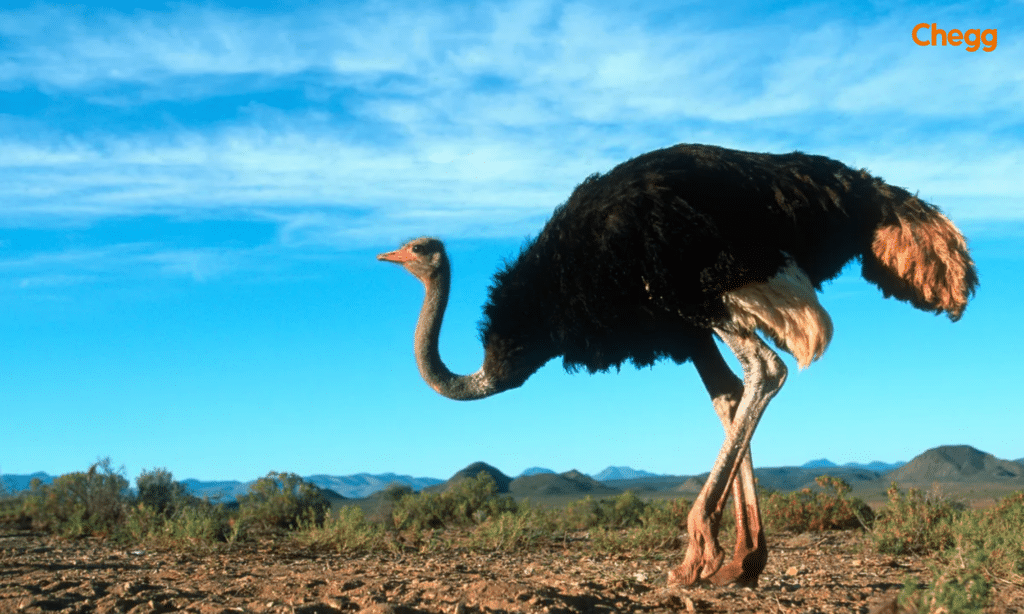
Emu (Dromaius novaehollandiae), which are native to Australia, are the second-tallest birds alive, with a maximum height of 190 cm. On average, their weight is 33 kg. The rumps of female emus are noticeably wider and they are typically slightly larger than those of males.
Despite not being able to fly, emus have developed the ability to run quickly and have vestiges of wings that they flap to stabilize themselves. They have fewer bones and muscles in their feet, and they only have three toes. The gastrocnemius muscles, which are located in the rear of the lower legs, are unique to emus.
The common ostrich (Struthio camelus) is the largest bird species still living, closely followed by the Somali ostrich (Struthio Molybdophanes). An adult male ostrich can reach a height of 2.8 meters (9.2 feet) and weigh an incredible 156.8 kg (346 lb). While the ostrich has been reported to weigh 200 kg (440 lb), there are no confirmed examples of this weight in the wild.
The ostrich(Biggest Bird in the World) holds the unique distinction of having the largest eggs of any bird species, with an average weight of an astounding 1.4 kg (3.1 lb). The top ten biggest birds in the world are listed below in full:
| S. No. | Birds | Scientific Name | Height | Weight | Flighed |
| 1. | Common Ostrich | Struthio camelus | Up to 2.7 meters | Up to 130 kg | No |
| 2. | Somali Ostrich | Struthio molybdophanes | Up to 2.7 meters | Up to 130 kg | No |
| 3. | Emu | Dromaius novaehollandiae | Up to 2 meters | Up to 70 kg | No |
| 4. | Southern Cassowary | Casuarius casuarius | Up to 2 meters | Up to 76 kg | No |
| 5. | Dalmatian Pelican | Pelecanus crispus | Up to 2 meters | Up to 15 kg | Yes |
| 6. | Northern Cassowary | Casuarius unappendiculatus | Up to 2 meters | Up to 76 kg | No |
| 7. | Mute Swan | Cygnus olor | Up to 1.7 meters | Up to 14 kg | Yes |
| 8. | Trumpeter Swan | Cygnus buccinator | Up to 1.7 meters | Up to 14 kg | Yes |
| 9. | Greater Rhea | Rhea americana | Up to 1.7 meters | Up to 40 kg | No |
| 10. | Marabou Stork | Leptoptilos crumenifer | Up to 1.7 meters | Up to 9 kg | Yes |
The Wandering Albatross is the largest flying bird in terms of wingspan. This bird has the largest wingspan with 12 feet. However, in terms of weight, the Great Bustard is the largest flying bird, weighing up to 40 pounds.
The second biggest flying bird in the world is the Dalmatian pelican. This is because Dalmatians can spread their large, broad wings up to 8-11.5 feet. They can even reach up to 10,000 feet above sea level.
Dalmatian pelicans also have bigger appetites. An adult pelican can gobble about 4 pounds of fish in just one day. They are also good at fishing.

Many birds have gone extinct, but the ostrich is the largest living bird. The main two factors making Ostrich the largest living bird are its height and weight. You can find Ostrich in Africa because it is their native place.
The Andean Condor is also among the most prominent living birds. Ostriches(Biggest Bird in the World) can open their wings up to 10.5 ft. and can fly to a height of 18,000 feet.
The large wings help Andean condors fly with ease and less effort. During a single feast, they can gulp down about 15 pounds of carrion (dead or decaying flesh, according to the San Diego Wildlife Alliance).
Ostriches(Biggest Bird in the World) spend a longer duration of their lives in captivity, around 80 years. However, they can live in the wild for around 50 years, as mentioned by the Wildlife Conservation Society Peru. Hence, they are considered to be long-living creatures!
Ruppell’s vulture is the highest-flying bird in the world. Learn some facts about Ruppell’s vulture and why they are considered the highest-flying bird in the world:
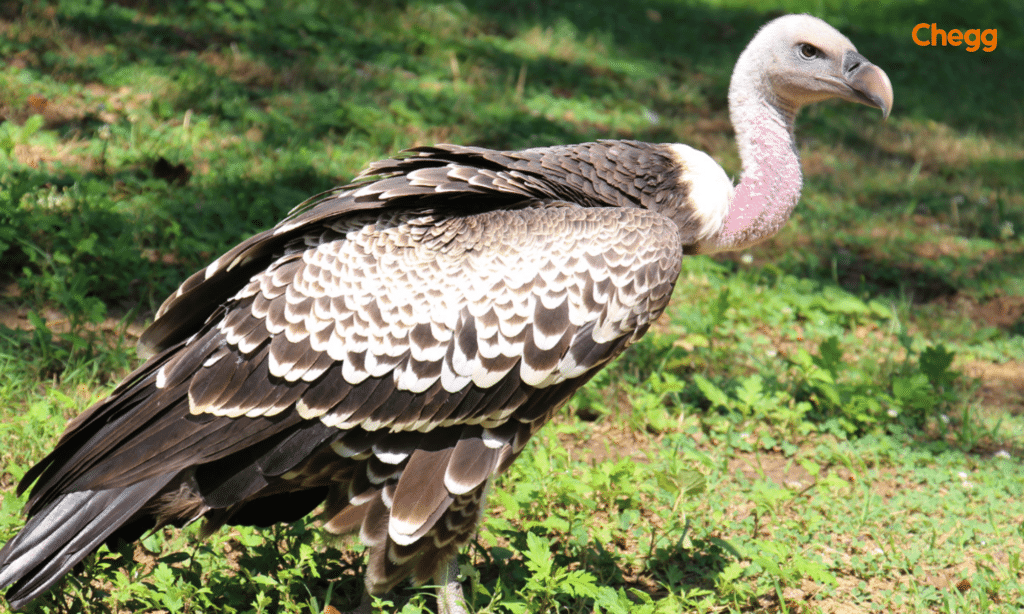
Birds come in various sizes, but some species are truly massive in stature. Here’s a list of the top 10 largest birds in the world by height and weight:
1. Ostrich
2. Somali Ostrich
3. Emu
4. Rhea
5. Cassowary
6. Greater Rhea
7. Kiwi
8. Wandering Albatross
9. Andean Condor
10. Whooper Swan
Once again, the Ostrich comes 1st in the category of tallest bird in the world. It is because of its 9 ft height. Now, come to the 2nd position for the tallest bird, the Emus. They live in Australia and can reach up to 6.2 ft. These birds have long necks and legs, which help them to run faster and cover a distance of 50 km per hour.
Shoebills are also one of the tallest birds in the world. These unusual storks reach impressive heights of about 5 feet (roughly as tall as a grown-up). As hunters, shoebills are skilled and have a good chance of making a successful catch. When they spot something tasty in the water, they strike their prey and are pretty successful, catching it about 60% of the time.
Shoebills are independent. They like to go solo and rarely hang out in big groups. Each shoebill has its territory, which is about 1 square mile, or roughly 3 square kilometers in size.
The Wandering Albatross is truly remarkable and is considered the largest wingspan bird. Their average weight of 11.9 kg makes them extremely hefty, and their height is around 135 cm. An albatross’s wings may spread to a maximum of 3.6 meters.
Wandering albatrosses are exceptional flyers. They spend their time flying in the sky and can fly without a break for a long time. These birds are famous for traveling long distances without needing a break. Among all birds, they are known to be some of the best fliers.
There are records of individual wandering albatrosses circling the entire Southern Ocean three times in just one year. That’s like flying around the world three times!
The common Ostrich (Struthio camelus) is again the largest bird and also the heaviest bird. Emperor penguins live only in Antarctica and are among the heaviest and largest birds alive. On average, Ostriches(Biggest Bird in the World) weigh about 31.5 kg and stand 114 cm tall.
During breeding time, male Emperor penguins go through quite a transformation. Ostriches(Biggest Bird in the World) can lose up to 15 kg because they don’t eat anything while they protect their eggs from the extreme cold for over two months.
Emperor penguins, just like all penguins, can’t fly. But they have adapted themselves to the cold weather. Their feathers act like a warm coat, providing nearly 90% of their insulation. Also, they can control their body temperature. It’s like they have their built-in heating system! These penguin species have adapted according to the cold surroundings, making them true masters of cold weather.
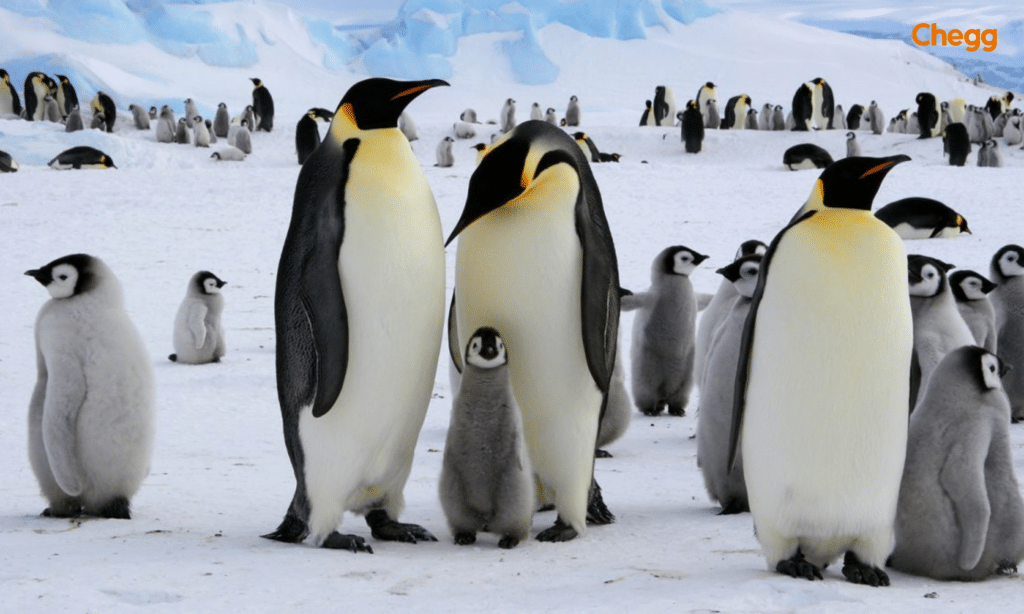
The wild turkey, scientifically known as Meleagris gallopavo, is remarkable. The wild turkey is one of the biggest bird species you will find. On average, it weighs about 13.5 kg and measures around 124 cm long.
They are native to North America but got their name from the domesticated turkey. The domestic turkey was mistakenly considered a completely different bird and was even linked to Turkey because Turkish merchants imported it into Europe.
However, domestic turkeys can not fly because they are a bit plump. They don’t use their breast muscles much, which makes their breast meat white.
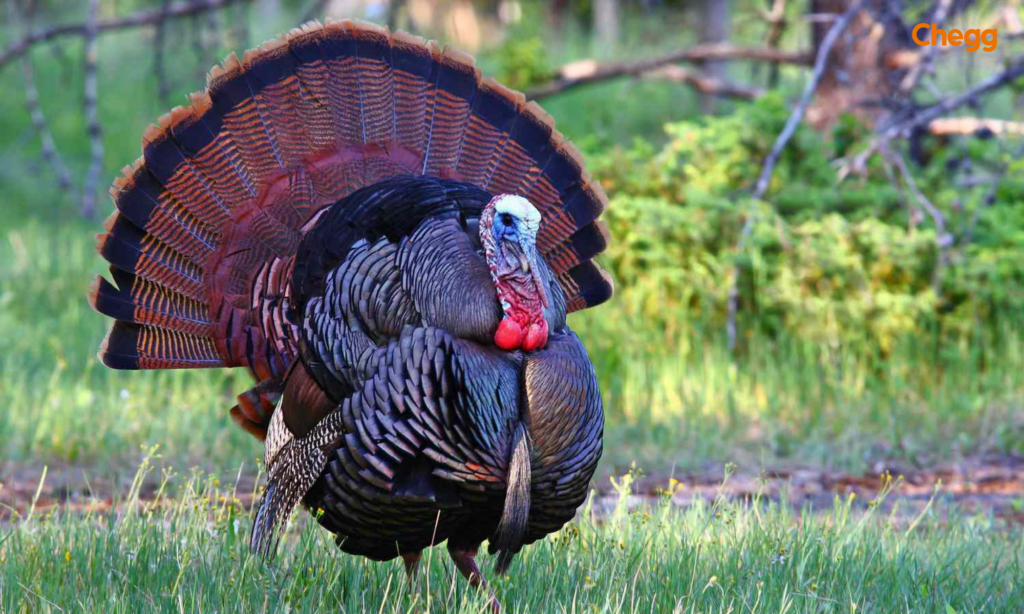
Bird conservation is crucial for maintaining biodiversity and ensuring bird species thrive. Below are key efforts made globally to protect birds:
1. Habitat Protection
2. Threat Mitigation
3. Endangered Species Protection
4. Public Awareness and Education
5. Monitoring and Research
6. Global Partnerships
7. Fighting Illegal Trade and Hunting
8. Climate-Smart Agriculture
9. Invasive Species Control
Wildlife has become an essential place for animal species. They provide various ecological services and promote human welfare towards the species. Simply by existing, wildlife has worth as well.
Due to unfavorable impressions around the mere existence of a wild animal, interactions between people and wildlife are frequently referred to as “conflict” situations.
Some tribes have managed to cohabit peacefully with enormous birds. We can get a peaceful coexistence between people and the most enormous birds in the world by respecting them as they are part of our ecosystem.
Also Read:-
In ancient times, there was a mythological bird called Roc. It is described as a giant eagle that could catch and eat a full-grown elephant. Their vast wings can create heavy winds in the sky. People have mentioned India, China, the Middle East, and Madagascar as their homeland.
There are stories about the Roc in a religious book from Ethiopia called The Kebra Nagast. According to the book, the Roc once brought a piece of wood to Solomon to help him finish building his temple.
It is said that the Roc myth is the imagination of the people, like tales of fire-breathing dragons. Some people considered it a truth, and some took Roc’s myth as a story.
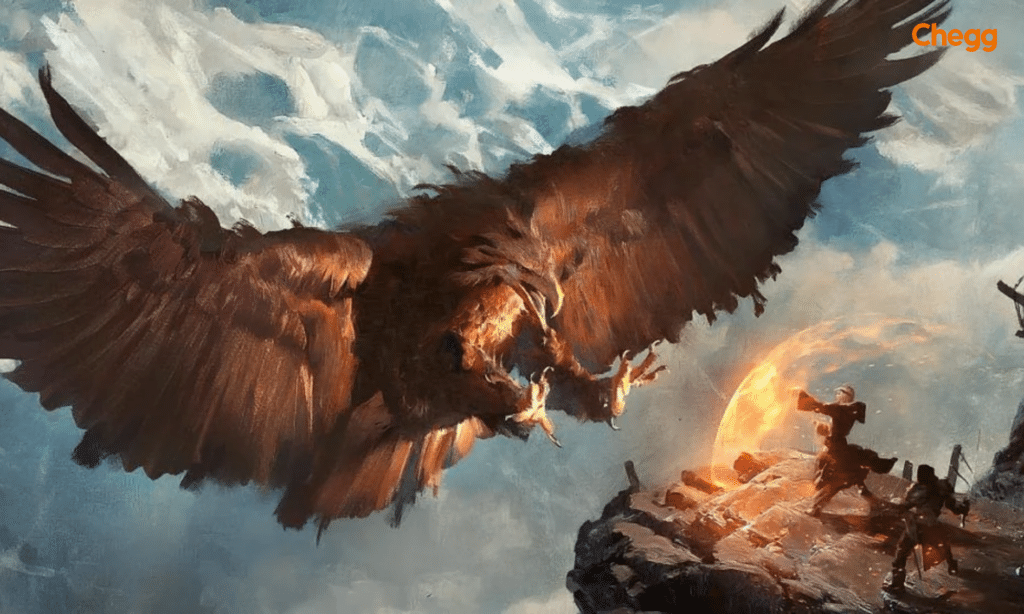
The future of birds should be brighter. According to the current situation, many giant birds have become extinct. The changes going place on the earth may influence these massive feathered creatures. Because the Earth is warming due to climate change, losing their houses may make life more difficult.
Environmental changes are affecting the population of giant birds and their habitat. If we want to save the birds’ population, we must understand the environmental changes and work accordingly so they don’t harm their habitat.
As previously stated, conservation initiatives and constructing protected areas can help these largest birds survive in this environment.
In the world in which we live, there are many giant birds like Ostrich, emus, condors, and so on. Besides having amazing facts, birds are becoming extinct. You have studied many largest birds and their fascinating facts in this article. You must also keep in mind how to save them. Because birds are a part of our ecological system.
We must save their population from becoming extinct to keep a balance in our environment. We can participate in conservation programs by opening more national parks for them. Also, we can protect them by not damaging the environment or spreading pollution. It can harm their population and habitat. To save these creations, we must work together for their betterment by following the above points.
From the towering ostrich(Biggest Bird in the World) to the vast wandering albatross, some of the largest birds on Earth inspire us with their immense size and grandeur. These avian giants play indispensable roles in ecosystems across the continents through seed dispersal, scavenging, and maintaining balance in food chains. Tragically, though, many populations of these magnificent birds are now classified as vulnerable or endangered.
As human activity encroaches further upon their breeding and feeding grounds, extinction threatens these species. Safeguarding the future of the giant birds worldwide will require coordinated conservation efforts at both local and global scales. If we can effectively mitigate habitat degradation, combat climate change, and reduce further human disturbance of these birds, we may reverse current population declines.
Our planet’s remaining ostrich, condor, eagle, and albatross populations represent the dignified grandeur inherent in the natural world. By protecting these iconic giant bird species, we take a stand for the intrinsic value of all wildlife while preserving balance and beauty in Earth’s precious ecosystems.
The Andean condor is the largest living land bird capable of flight if measured in terms of average weight and wingspan, although male bustards of the largest species (far more sexually dimorphic in size) can weigh more.
The Sarus crane is the tallest flying bird in the world standing 152-156 cm tall with a wingspan of 240cm. It has a predominantly grey plumage with a naked red head and upper neck and pale red legs. It weighs 6.8-7.8 Kgs.
The largest bird of India is the Great Indian Bustard. It is a ground bird with a height of about 1 metre, and weighs up to 15 kg. The Great Indian Bustard is found in dry grasslands and scrublands in India.
Therefore, eagle is known as the king of birds. The lion is considered to be the king of beasts and likewise the eagle is the king of birds. It is the favourite of kings and sardars, and flies high. The eagle is obviously different from other birds because of its strong and powerful body and sharp beak.
Ostriches are the world’s largest living birds. There are two species of this flightless giant – the common ostrich, Struthio camelus, and the Somali ostrich, Struthio molybdophanes. Both live in Africa. Two subspecies of the common ostrich claim the records for the tallest and heaviest birds in the world.
After taxonomic reshuffling and examination of collected elephant bird remains, researchers say that a member of a previously unidentified genus of the largest birds could have weighed more than 1,700 pounds, making it by far the largest bird ever known.
There are two entries for “world’s fastest bird” in the Guinness Book of World Records. The fastest in horizontal flight is the White-throated Needle tail at 170 km/h, and the other record for fastest speed in a downward dive (called a stoop) is held by the Peregrine Falcon at 389 km/h.

Authored by, Amay Mathur | Senior Editor




Amay Mathur is a business news reporter at Chegg.com. He previously worked for PCMag, Business Insider, The Messenger, and ZDNET as a reporter and copyeditor. His areas of coverage encompass tech, business, strategy, finance, and even space. He is a Columbia University graduate.
Editor's Recommendations
Chegg India does not ask for money to offer any opportunity with the company. We request you to be vigilant before sharing your personal and financial information with any third party. Beware of fraudulent activities claiming affiliation with our company and promising monetary rewards or benefits. Chegg India shall not be responsible for any losses resulting from such activities.
Chegg India does not ask for money to offer any opportunity with the company. We request you to be vigilant before sharing your personal and financial information with any third party. Beware of fraudulent activities claiming affiliation with our company and promising monetary rewards or benefits. Chegg India shall not be responsible for any losses resulting from such activities.